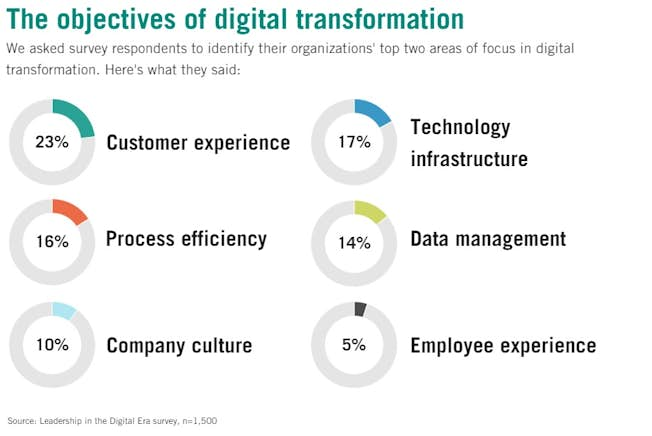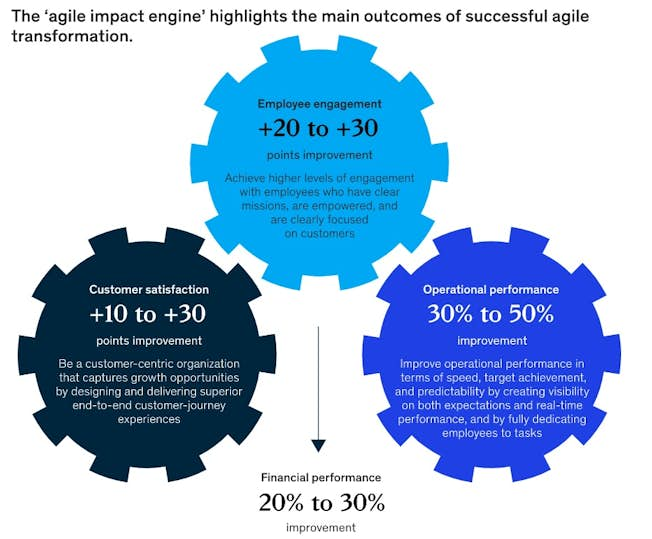May 12, 2022
What are the Benefits of Digital Transformation?
Adopting and adapting to digital is crucial for businesses across industries to compete and succeed. But it can be difficult for many to navigate their way through digital transformation to connect with customers and have an influence online.
With digital disruptors snapping at the heels of many industries (just think of travel sector transformer Airbnb and audio disruptor Spotify) success will come to businesses that ensure their staff has the necessary digital skills to future-proof a workforce. Essentially any transformation must be woven into the fabric of the company and championed by senior leaders to have the greatest impact.
Unfortunately, many businesses are falling behind. Some think they are too late to get started. According to Boston Consulting Group, only 30 percent of companies navigate a digital transformation successfully. And it’s only going to get harder as digital technologies keep evolving and customers will leave behind brands that don’t operate online - whether that’s for customer service or ecommerce.
In this article, we look at the workforce and business benefits of digital transformation and offer ways to help you get there faster.
Transforms Customer Experience
The world’s obsession with the latest technology, social media and apps revolve around a desire for an easier life. People want valuable solutions to their problems. More importantly, they want it fast.
The experience of customers is at the heart of digital, especially for customer-facing industries such as government, healthcare, manufacturing, and retail. As a result, the primary focus of digital transformation is to use cutting-edge technology to improve the customer experience.
‘Leading in the Digital Era’ from Harvard Business School revealed the objectives of digital transformation based on responses from senior executives and customer experience came out as number one followed by technology infrastructure.

“In banking, the mobile app is the digital version of the book you got when you went to a opened an account. That's what financial services did for a long time. The net effect was huge disruption when people looked at the process and reinvented it. Digital transformation is about reinventing the business model and the process.” Brian Coorish, Managing Director, Accenture Interactive
Drives data-based insights
One of the great benefits of going digital is the ability to track metrics and analyze the data that is gained during digital marketing efforts. Using these insights allows businesses to optimize their strategies and processes for even better results.
In businesses, only two things really matter - costs and revenue. It’s possible to make massive changes to both by integrating data-based insights into the company culture.
Using data-driven insights to understand customers and feeding them back into business strategy enables hyper-personalization, relevancy, real-time feedback, and agility. This challenges businesses to make use of both structured (personal customer information) and unstructured data (social media metrics) pulling together data from many sides of the business to help drive the transformation journey.
The importance of data in decision-making and data-driven marketing should not be underestimated. With the right leadership to encourage this attitude throughout an organization, the road to a higher ROI will become much easier.
Encourages collaboration & improves employee experience
Many people fear change. The thought of the entire organization making a massive digital transformation can be a daunting prospect for a workforce from leadership to entry-level employees. All processes and strategies, down to the core structure and company culture need to be addressed.
However, in that, there is an opportunity for unity throughout the workforce. To maximize the chances of a successful switch, there needs to be strong communication from leadership and a focus on employee experience.
As employees experienced burnout and increased workloads during the pandemic many chose to quit their jobs or change careers in a phenomenon coined ‘The Great Resignation’. Couple this with the growing shortage of skills - particularly digital skills and you can see that many transformations could be hampered at a time when they need to accelerate.
The solution? Companies need to provide support and guidance to staff in their digital transformation journey. Employees should understand the purpose of the transition and see it as a benefit to customers and the company - why they are doing this work - in its development and growth rather than just focusing solely on strategy and vision.
People who have a positive employee experience have 16 times the engagement level of employees with a negative experience and are eight times more likely to want to stay at a company - McKinsey Employee Experience Survey
With the right tools and training, employees can break down age gaps and social divides to engage in conversations and learn together. A solid leadership mindset with clear guidance will improve the digital intelligence of the workforce and encourage collaboration.
Increases agility & innovation
In business, agility is the ability to continuously improve and develop quickly, especially regarding digital processes.
An agile organization is better equipped to navigate uncertainty, define responsibility and accountability, mitigate risk and achieve specific outcomes. This will help you achieve success for the business that is sustainable.
Becoming an agile enterprise sees huge boosts for the bottom line and operational performance along with employee engagement and customer satisfaction according to McKinsey & Co.

Dr. Brigit Koenig, CEO of German’s Allianz Health, summed up the state of business in the digital age, when she said, “It’s never over. There is always change and always more to do.”
The rapid development and ever-evolving nature of the digital landscape leave no time for companies to rest on their laurels. Being agile also means that companies are ready for innovation and can even spot gaps or opportunities in the market as they are aware of the digital space.
Even those on top must be ready to adapt and innovate. There will always be new competitors, new tools, and new digital trends. That means that the customer will demand more, wanting it faster and better than before. Staying ready and agile is crucial.
Updates skillsets & knowledge
As new digital technologies continue to go stratospheric, the demand for specialized skills to master them will grow.
A report by The World Economic Forum found that on average, companies estimate that around 40 percent of workers will require reskilling of six months or less and 94 percent of business leaders expect employees to pick up new skills on the job compared to just 65 percent two years previous.
The future of digital business in 2025 is looking to be heavily built upon soft skills such as critical thinking, analysis problem-solving, and skills in self-management such as active learning, resilience, stress tolerance and flexibility.
In terms of roles, those increasing in demand are:
- Data Analysts and Scientists
- Artificial Intelligence and Machine Learning Specialists
- Big Data Specialists
- Digital Marketing and Strategy Specialists
- Process Automation Specialists
- Business Development Professionals
- Digital Transformation Specialists
Digital transformation demands new skillsets among employees at all levels across all departments. The key is to offer continuous training that helps staff develop skills for the future as well as equip their business with the in-house knowledge to sustain growth and a competitive edge in the digital age.
Fosters a digital culture
“One out of two or one out of three jobs requires reskilling. As you think about 2025 and current roles if I'm an accountant, etc., there's going to be reskilling required. I'm a fan of learning circles which corporations are really wiring into.” Barry Thomas, Senior Retail - Commerce Consultant, Kantar
Central to this flexible and adaptable nature is creating and cultivating a strong digital culture. This will allow the workforce to remain productive and engaged in the transformation without feeling overwhelmed or disconnected from the process.
Merely having the technology in place is not enough. If a business is to succeed in the future, the organization must adopt and apply a company culture that embraces change.
This requires a focus on employee experience (as mentioned in an earlier section) in the same way a business would focus on customer experience. You can help to improve employer experience by:
- Providing access to the right tools and software
- Offering relevant training that can be accessed easily and at any time for career development
- Introducing corporate social responsibility initiatives that employees can get involved in
- Offering flexibility such as remote or hybrid working
A company culture that immerses the workforce in a digital learning environment is a significant benefit, helping them upskill for years ahead along with climbing up the ladder to become digital-savvy employees.
Consolidates process & operations
Putting money aside, the greatest universal benefit that technology has given businesses is that it has made it easier to connect with other people.
By going digital, companies can bring more than just their workforce together, but also their entire architecture. This includes social media, analytics, and project management interfaces.
This consolidation of the company processes and operations enables the business to connect with its target audience and satisfy its needs.
Take the logistics courier service, DHL as an example. Their strategy towards 2025 is ‘Delivering excellence in a digital world’ bolstered by an investment of over $2 billion on digital transformation projects. Two key areas that have accelerated their digital transformation are an improved digitized customer experience and advanced quality control.
The first project looked at how to improve customer service. The company employed chatbots for delivery updates, on-demand delivery so customers could schedule a delivery at a time that suits, and QR codes for easy returns. The quality control project uses big data to make predictive analyses on deliveries and shipments along with using AI and ML to enable the system to adapt and improve itself.
Conclusion: The Benefits of Digital transformation
The future of digital transformation is no longer a dot on the horizon. The pressing need to become digitized cannot be ignored - certainly not if your organization has any interest in success or profits. The digital age isn’t new, but it is different.
You need to be where your customers are and that’s online. As technologies continue to develop and social media evolves to enable in-app purchases, ensure your business has the know-how and skills to connect, engage and influence in the digital space.
Updated 2022
Transform your organization & workforce with digital skills
Digital transformation is not just about technology, it’s about the people in a business. To get ahead in your transformation journey invest in your team and ensure they have the training and support required to learn new digital skills and hone existing ones. Get in touch with our Business team today to find out about tailored digital marketing and digital selling training that can transform your workforce.
Related
- Categories:
- Articles
- Digital Management and Leadership
Upgrade to Power Membership to continue
your access to thousands of articles, toolkits, podcasts, lessons and much much more.
Become a Power Member- Login
- View Courses
- - - -
- Courses
- Resources
- - - -
- My Account
- Change Password
- Logout





